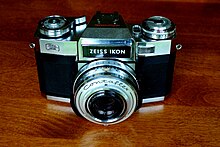Contaflex (SLR)
 |
|
| Overview | |
|---|---|
| Type | 35mm SLR camera |
| Lens | |
| Lens mount | bayonet |
| Focusing | |
| Focus | manual |
| Exposure/Metering | |
| Exposure | manual |
| Flash | |
| Flash | cold shoe |

Early Contaflex IV SLR Camera
|
|
| Overview | |
|---|---|
| Type | 35mm SLR camera |
| Focusing | |
| Focus | manual |
| Exposure/Metering | |
| Exposure | manual |
 |
|
| Overview | |
|---|---|
| Type | 35mm SLR camera |
| Focusing | |
| Focus | manual |
| Exposure/Metering | |
| Exposure | manual |

Contaflex Super B
|
|
| Overview | |
|---|---|
| Type | 35mm SLR camera |
| Focusing | |
| Focus | manual |
| Exposure/Metering | |
| Exposure | automatic/manual |
 |
|
| Overview | |
|---|---|
| Type | 35mm SLR camera |
| Focusing | |
| Focus | manual |
| Exposure/Metering | |
| Exposure | manual |
The Contaflex series is a family of 35mm leaf-shuttered SLR cameras, produced by Zeiss Ikon in the 1950s and 1960s. The name was first used in 1935 on a 35mm Twin-lens reflex camera, the Contaflex TLR also by Zeiss Ikon, the -flex part in the name referring to integral mirror for the viewfinder. The first models, the Contaflex I and II have fixed lenses, while the later models have interchangeable lenses, and eventually the Contaflexes became a camera system with a wide variety of accessories.
The first Contaflex SLR was introduced in 1953 as one of the earliest 35mm SLR cameras equipped with a leaf shutter, but with a fixed lens. The Mecaflex was presented at photokina in 1951 and launched two years later with a leaf shutter behind the removable lens, while the Hasselblad 500C of 1957 has a leaf shutter in its interchangeable lens. This design, using a leaf shutter in an SLR, involves a complex sequence of events when the shutter is released, more looked upon as a challenge than a drawback at Zeiss Ikon, but no Contaflex model ever got a rapid return mirror. The advantages are low manufacturing costs, compactness and flash synchronization at all shutter speeds. However, only a very limited range of interchangeable lenses became available. For the models I and II, having a fixed lens, only three add-on converters were offered using a slide-on adapter, but from models III and IV onwards interchangeable lenses from 35mm to 115mm focal length were provided; at the time regarded as quite sufficient, as most would only be used with the standard lens anyway.
Three years later, during 1956, the Kodak Retina Reflex was launched, followed by the Voigtländer Bessamatic and the Ultramatic. The market soon flourished with leaf-shuttered SLR cameras. These mechanical complex cameras required precision assembly and high quality materials. More often than not many camera makes suffered from reliability issues, while the few better ones performed well, selling in quantity.
The Contaflex I, launched in 1953, was equipped with a fixed Zeiss Tessar 45mm f:2.8 lens with front-cell focusing. The very first Contaflex I had a Synchro-Compur shutter with the old scale of shutter speeds (1-2-5-10-25-50-100-250-500), but very soon it adopted the new scale 1-2-4-8-15-30-60-125-250-500.
...
Wikipedia
